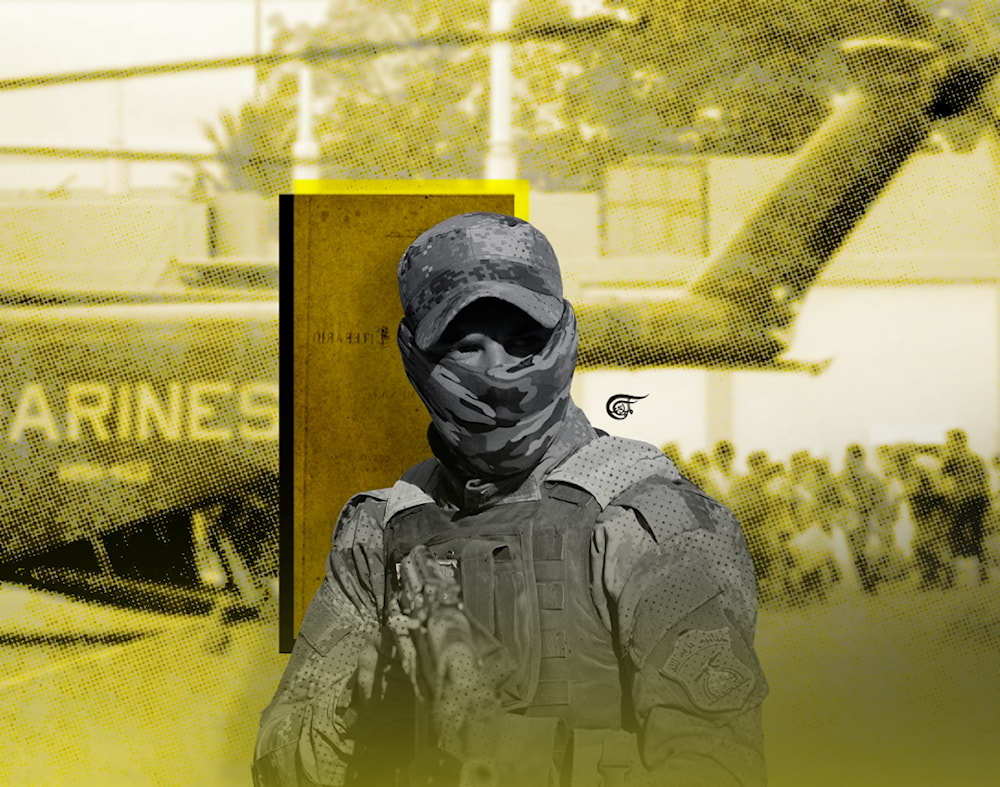The Iraqi Resistance and the US’ Conundrum
It is clear that the next Vietnam-Afghanistan moment for the US will occur with a withdrawal from Iraq and Syria. However, the sequence of this withdrawal or the possibility of it occurring altogether is yet to be determined.
-

Any real retaliation by the US will lead to climbing an escalation ladder that may invoke a regional war - one that will lead the US into a quagmire at best or an embarrassing loss at worst. (Al Mayadeen English; illustrated by Zeinab El-Hajj)
The Palestinian Resistance's operation Al-Aqsa Flood has called the Axis of Resistance into action. From Lebanon’s Hezbollah to Iran’s Islamic Revolutionary Guard Corps, the groups that make up this axis have harmonized in action while maintaining their own sovereignty to assist their Palestinian allies.
The Iraqi component of the Resistance Axis has played a crucial role in this operation. With the changing geopolitical landscape and the threat of full-scale regional war due to US insistence to maintain power, this role will only grow more significant. Various Iraqi groups composed of militias both within and outside of the Popular Mobilization Forces (PMF) have successfully targeted US bases within occupied Iraq and Syria, as well as the US embassy in Baghdad with barrages of rockets, drones, and mortars, delivering successful blows.
The US has been the primary aggressor in the region now for decades. Without the US’ political cover and economic aid, "Israel" would not be able to last very long against the steadfast Palestinian Resistance, and neither would the US proxy forces in the region such as the “Syrian Defense Forces,” Kurdish militias, and more. Its very presence is a threat to regional stability, making it the primary target for Resistance groups.
To date, the combined attacks of the Iraqi Resistance forces against US bases since October 7 have exceeded 100, which is interesting from the perspective of say, a certain Washington think-tank that predicted that the PMF is on “a downward spiral.”
The US, in turn, has retaliated against Iraqi Resistance forces by striking various bases of operations and assassinating a PMF leader. Iraqi officials, including Prime Minister Mohammed Shia Al-Sudani, condemned the attack as an aggression on Iraqi sovereignty, further suggesting the US-led coalition should begin to finally leave Iraq. The Pentagon has rejected this idea.
Instead, the US has vowed an additional troop deployment of 1,500 soldiers across its bases in both Iraq and Syria, citing the threat of “ISIS”, regionally known as Daesh terrorists. This would bring the official total number of troops to approximately 3,500.
There have been no major battles between US forces and ISIS as of late. Interestingly enough, ISIS/Daesh terrorists seem more likely to attack PMF bases over US ones.
That’s not surprising to the initiated. PMF forces were among the main forces that oversaw the destruction of Daesh in Iraq, and they continue to fight them, while American troops primarily focus on protecting trade routes between their bases in Iraq and Syria. US Military analysts agree that the role the PMF played in neutralizing the Daesh threat has earned them recognition and legitimacy among the Iraqi people. In short, the tried and tested warriors of the PMF have truly earned the term “Popular” in their title.
It is a no-brainer that the American occupation bases are primarily in Iraq and Syria for the facilitation of oil theft. This is something that most Democrats will deny, but former president Donald Trump unflinchingly admitted, “We’re keeping the oil, we have the oil, the oil is secure, we left troops behind only for the oil.”
The justification is perhaps neck-and-neck with another reason: blatant occupation and enforcement of the so-called “rules-based order” via shadowy operations conducted through Mossad-linked safehouses near US bases. On January 16, Iran’s Islamic Revolution Guard Corps (IRGC) targeted some of these safehouses in Iraq near the US' Erbil airbase, in retaliation for the Mossad's role and involvement in the terrorist attack in Kerman earlier this month. The IRGC’s intelligence confirmed the existence of Mossad cells within Iraq, facilitated by the US, encroaching on Iraqi sovereignty.
The fact of the matter is the public-facing justification for nearly 2,000 more US troops on the grounds of “the ISIS threat” is completely unfounded. The reality is that the United States knows it is losing its grip on power, and is scrambling to maintain it with additional troop deployments. This is an admission that the Resistance Axis has fortified itself and switched the power dynamics of the region completely.
The combined reach of the Iraqi Resistance alone - and its success - is growing. In late December, a coalition of groups credited as “The Islamic Resistance in Iraq” launched an attack that targeted the “Israeli” port city of “Eilat” (known by its original name as Umm al-Rashrash). Then, they successfully hit the port city again just a few days later. US bases within the region (as well as US vessels near the port) were unable to shoot down the combination rocket/drone attack.
Furthermore, the Islamic Resistance’s ability to hit multiple bases within hours of each other across Iraq and Syria demonstrates that the US, which maintains state-of-the-art weaponry and reconnaissance tools, is unable to deter them. After taking credit for each attack, the Islamic coalition released statements vowing to “continue to destroy enemy strongholds.”
While the Islamic Resistance's coalition is launching its own barrage of rockets and drones, more commonly known resistance groups are also exerting pressure on occupation forces under their own individual banners. For example - Iraq’s Harakat Hezbollah al-Nujaba resistance movement was able to strike Haifa, demonstrating its long-range missile capabilities, while anti-terror group Kata’ib Hezbollah promised further retaliation if the US tries to resist the operations in any way.
It's clear that the US intends to resist this retaliation with a new deployment of forces, but one must examine what sort of “deterrence” the US is hoping to achieve. The RAND Corporation, an American global policy think tank, writes "U.S. intervention would also shift negative public attention in Iraq from the PMF to the United States, further undermining U.S. influence." Essentially, the US escalating aggression against the PMF would serve as a rallying cry for Iraqis to unite against the US, which has been a growing trend since the assassination of Resistance leaders Qasem Soleimani and the PMF’s own Abu Mahdi al-Muhandis.
These seasoned fighters have the potential to force a retreat of US forces, despite the US doubling down on more - which would change the makeup of the region. Militarily, they are successfully striking US bases multiple times per week. Politically, US retaliation is met with a growing resentment of US forces within the Iraqi parliament and society. And of course, economically, the US is spending millions of dollars per day to demonstrate its own growing weakness.
The US is now facing a conundrum: It aims to perpetuate the illicit plunder of valuable Syrian and Iraqi oil while concurrently establishing a counterweight against the Resistance Axis. However, any real retaliation will lead to climbing an escalation ladder that may invoke a regional war - one that will lead the US into a quagmire at best or an embarrassing loss at worst.
The effectiveness of the Iraqi Resistance has started a timer for US forces to withdraw. As Resistance operations deliver crushing blows and target US-occupied oil fields, major economic damage could halt occupation operations, costing millions of dollars. Additionally, the US striking back at Resistance groups - particularly the PMF - only accelerates their departure as even US-friendly Iraqi politicians become critical. US forces must wrestle with these factors amid a relentless barrage of rockets and mortars targeting their bases.
It is clear that the next Vietnam-Afghanistan moment for the US will occur with a withdrawal from Iraq and Syria. The sequence of this withdrawal or the possibility of it occurring altogether is yet to be determined. For the US, the writing is on the wall: power dynamics are shifting, thanks to the meticulous planning of the Resistance Axis. How much longer will the US prolong its inevitable retreat?

 Shabbir Rizvi
Shabbir Rizvi
 8 Min Read
8 Min Read











